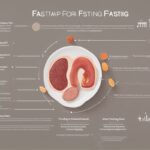Hey there, health enthusiasts! If you’ve ever wondered how skipping a meal or two could potentially rev up your metabolism and improve your overall well-being, you’re in the right place. Today, we’re diving deep into the fascinating world of health fasting and its profound effects on metabolism. Fasting isn’t just a trend; it’s a practice rooted in history and backed by science, offering benefits from weight management to enhanced cellular repair. Whether you’re a seasoned faster or just curious about intermittent fasting for health, this post will break down the science, bust some myths, and provide actionable tips to help you harness the power of fasting for a healthier life. Let’s get started!
What Is Health Fasting, and Why Does It Matter?
When we talk about health fasting, we’re referring to the intentional abstention from food and sometimes drink for a specific period. This isn’t about starvation or deprivation; it’s a strategic approach to eating that can include methods like intermittent fasting (IF), time-restricted eating, or even extended fasts. The goal? To give your body a break from constant digestion and trigger metabolic processes that promote healing and efficiency. Historically, fasting has been part of cultural and religious practices for centuries, but modern science is now catching up, showing how fasting impacts metabolism at a cellular level (Mattson et al., 2017). By understanding fasting, you can tap into a natural way to support weight loss, improve energy levels, and even reduce inflammation. So, why does this matter? Because in a world of constant snacking and processed foods, fasting offers a reset for both body and mind.
How Fasting Affects Your Metabolism: The Science Explained
Let’s get into the nitty-gritty of how health fasting influences metabolism. Metabolism is the set of chemical processes that keep your body running—think of it as your internal engine, converting food into energy. When you fast, your body shifts from using glucose (from recent meals) to stored energy sources like glycogen and fat. After about 12–16 hours of fasting, glycogen stores in the liver deplete, and your body enters a state called ketosis, where it burns fat for fuel, producing ketones (Anton et al., 2018). This metabolic switch isn’t just about weight loss; it also triggers autophagy, a cellular “clean-up” process that removes damaged cells and promotes regeneration (Bagherniya et al., 2018). Studies suggest this can lower the risk of chronic diseases like diabetes and heart disease (Patterson & Sears, 2017). In short, fasting doesn’t slow your metabolism as some fear—it can actually optimize it when done correctly.
Key Benefits of Health Fasting for Metabolic Health
Beyond the metabolic switch, health fasting offers a range of benefits that can transform your wellness journey. Here are some of the standout advantages, backed by research, that make fasting a powerful tool for metabolic health:
- Improved Insulin Sensitivity: Fasting reduces insulin levels, helping your cells become more responsive to this hormone and lowering blood sugar spikes (Barnard et al., 2019).
- Enhanced Fat Burning: By depleting glycogen, fasting pushes your body to tap into fat reserves, supporting weight management goals.
- Reduced Inflammation: Fasting can lower markers of inflammation, which are linked to conditions like arthritis and heart disease (Mattson et al., 2017).
- Boosted Energy Efficiency: Ketones, produced during fasting, are a more efficient fuel source for the brain, often leading to improved focus and clarity.
These benefits aren’t just theoretical—they’re measurable outcomes that countless fasters report, alongside growing scientific evidence. Whether you’re looking to shed a few pounds or simply feel more energized, fasting for health could be a game-changer.
Common Myths About Fasting and Metabolism
Despite its benefits, health fasting is often misunderstood, leading to myths that deter people from trying it. Let’s debunk a few of these misconceptions to set the record straight. One big myth is that fasting slows your metabolism. Actually, short-term fasting can increase metabolic rate by boosting norepinephrine, a hormone that enhances fat burning (Zauner et al., 2000). Another misconception is that fasting leads to muscle loss. While prolonged fasting without proper nutrition can affect muscle, intermittent fasting paired with resistance training preserves lean mass (Moro et al., 2016). Then there’s the idea that fasting means starving yourself—not true! Fasting is about timing, not deprivation. Clearing up these myths helps you approach fasting with confidence and realistic expectations.
Practical Tips for Starting Your Health Fasting Journey
Ready to give health fasting a try? Starting can feel intimidating, but with the right approach, it’s manageable and even enjoyable. The key is to ease into it and listen to your body. Here are some practical tips to help you begin fasting for health without feeling overwhelmed:
- Start Small: If you’re new, try a 12:12 schedule—12 hours of fasting (including sleep) and a 12-hour eating window. Gradually move to 16:8 as you adjust.
- Stay Hydrated: Drink plenty of water during fasting periods to avoid dehydration and curb false hunger pangs.
- Choose Nutrient-Dense Meals: Break your fast with balanced meals rich in protein, healthy fats, and fiber to stabilize blood sugar.
- Avoid Overeating: It’s tempting to binge after fasting, but focus on moderate portions to maintain metabolic benefits.
- Track How You Feel: Keep a journal to note energy levels, hunger, and mood. This helps you tweak your fasting routine for optimal results.
Remember, fasting isn’t one-size-fits-all. Experiment with different methods like alternate-day fasting or the 5:2 diet to find what suits your lifestyle. And always consult a healthcare provider if you have underlying conditions or concerns.
Potential Risks and How to Fast Safely
While health fasting offers incredible benefits, it’s not without potential risks if done improperly. For some, fasting can lead to fatigue, irritability, or headaches, especially during the initial adjustment phase. Those with medical conditions like diabetes or eating disorders should approach fasting with caution and under medical supervision (Barnard et al., 2019). Over-fasting or ignoring hunger cues can also disrupt hormonal balance or lead to nutrient deficiencies. The solution? Balance and mindfulness. Don’t push yourself into extended fasts without preparation, and always prioritize nutrient-rich foods during eating windows. If you’re pregnant, breastfeeding, or underweight, fasting may not be suitable. Safety first—listen to your body, and don’t hesitate to seek professional advice to ensure fasting supports, rather than hinders, your health.
As we wrap up, it’s clear that health fasting is more than a passing fad—it’s a scientifically supported practice that can optimize metabolism, enhance energy, and promote long-term wellness. From triggering fat-burning ketosis to improving insulin sensitivity, the benefits are compelling for anyone looking to take control of their health. But remember, fasting isn’t a magic bullet; it’s a tool that works best when paired with a balanced diet, hydration, and a mindful approach. Whether you’re exploring intermittent fasting for health or considering a longer fast, start slow, stay informed, and make adjustments as needed. Here’s to unlocking the power of fasting and fueling your body for a vibrant, healthier future. Have you tried fasting yet? Drop your experiences or questions in the comments—I’d love to hear from you!
References
- Obesity, 26(2), 254-268.
- Bagherniya, M., Butler, A. E., Barreto, G. E., & Sahebkar, A. (2018). The effect of fasting or calorie restriction on autophagy induction: A review of the literature. Ageing Research Reviews, 47, 183-197.
- Barnard, N. D., Goldman, D. M., Loomis, J. F., Kahleova, H., Levin, S. M., Neabore, S., & Batts, T. C. (2019). Plant-based diets for cardiovascular safety and performance in endurance sports. Nutrients, 11(1), 130.
- Mattson, M. P., Longo, V. D., & Harvie, M. (2017). Impact of intermittent fasting on health and disease processes. Ageing Research Reviews, 39, 46-58.
- Moro, T., Tinsley, G., Bianco, A., Marcolin, G., Pacelli, Q. F., Battaglia, G., … & Paoli, A. (2016). Effects of eight weeks of time-restricted feeding (16/8) on basal metabolism, maximal strength, body composition, inflammation, and cardiovascular risk factors in resistance-trained males. Journal of Translational Medicine, 14(1), 290.
- Patterson, R. E., & Sears, D. D. (2017). Metabolic effects of intermittent fasting. Annual Review of Nutrition, 37, 371-393.
- Zauner, C., Schneeweiss, B., Kranz, A., Madl, C., Ratheiser, K., Kramer, L., … & Lenz, K. (2000). Resting energy expenditure in short-term starvation is increased as a result of an increase in serum norepinephrine. The American Journal of Clinical Nutrition, 71(6), 1511-1515.






